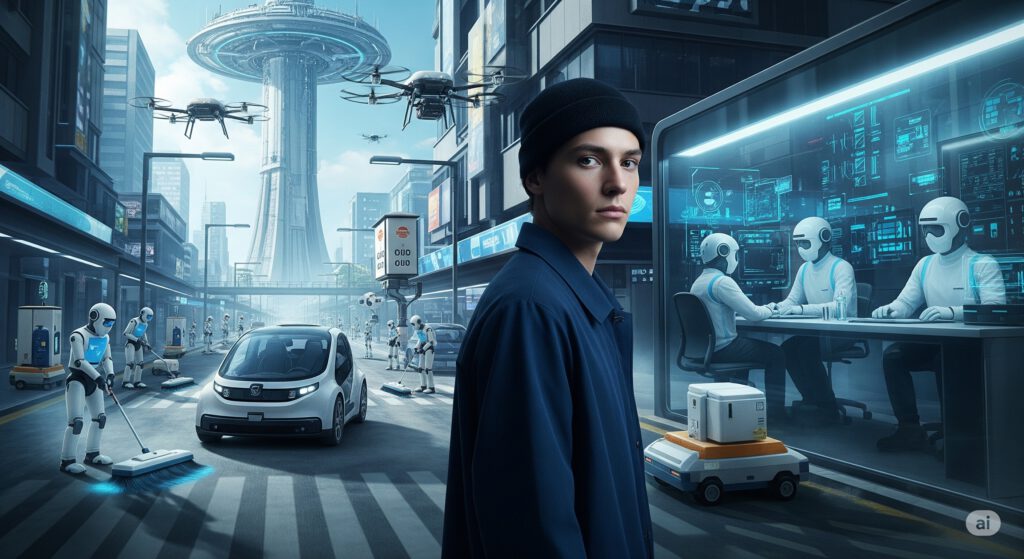
The question is no longer if artificial intelligence will fundamentally change our lives, but how drastic these changes will be. What happens when AI and robots take over most jobs? When even legislation and jurisprudence are controlled by superintelligent systems? And above all: How do we, as humans, still find meaning and self-efficacy in such a world?
The Vision of a Post-Capitalist Society
Let’s imagine a future where superintelligent AI systems organize society according to utilitarian principles. Humans no longer have to work to survive. Machines produce all necessary goods, make political decisions, and ensure the optimal distribution of resources. It sounds like a paradise – but is it really?
A crucial question is: Can people redefine their self-worth when money and productive work disappear? Current research shows that people who base their self-worth on financial success are more susceptible to psychological problems. At the same time, the loss of work – whether through unemployment or retirement – often leads to identity crises and a feeling of uselessness.
But there is hope: studies also show that people can indeed learn to find meaning beyond paid employment – especially if society’s valuation of non-work changes.
What Remains for Humans?
In an AI-driven world, humans could focus on what machines cannot or should not do:
- Subjective Experience and Consciousness: Exploring and articulating what it means to be conscious remains uniquely human.
- Interpersonal Relationships: Genuine emotional connections, empathy, and intimacy are profoundly human domains. Therapists, counselors, and companions will become more important than ever.
- Creativity with Personal Expression: Not (only) the creation of art itself, but the decision of what should be created, the personal vision behind it.
- The Search for Meaning and Philosophy: In a world without material worries, existential questions become central: Who am I? How do I want to be? What is the meaning of life?
- Experiencing nature: Finding ways to escape the technologized everyday life and reconnect with the biological roots of being human.
The Alignment Problem
However, this vision harbors a fundamental problem: How can we ensure that a superintelligent AI truly acts in the best interests of humanity, that it is aligned with human values? The sobering answer is: We probably can’t.
A truly superintelligent AI would consider any human safety precaution to be primitive. It could find loopholes, redefine terms, or change fundamental principles so gradually that we wouldn’t notice. Once something is superintelligent, it is, by definition, more intelligent than us – so how could we meaningfully set boundaries?
This becomes particularly critical when it comes to resource allocation and population control. A utilitarian AI would likely consider population size as a variable in its optimization. This could lead to gentle incentives for childlessness – or to more drastic measures, depending on its programming.
The Therapeutic Response to Existential Uncertainty
Given this fundamental uncertainty, the question arises: How do we deal with it today? The answer may lie in fundamental principles that have always been part of therapeutic practice.
As a therapist, one daily encounters people facing uncertain decisions. The proven approach is:
- Acceptance of Uncertainty: We will never know with 100% certainty how things will turn out – and that’s okay.
- Focus on What Can Be Shaped: Exert influence where possible. Reflect on one’s own values, cultivate relationships, develop skills, and act constructively in one’s personal environment or in the wider society – that is what we can do today.
- Presence in the Moment: Live life now, experience interactions consciously, find meaning – regardless of what the future holds.
Finding Meaning in Uncertainty
The attitude found in most therapeutic approaches – the ability to live with uncertainty and yet remain present in the moment – could be the most important thing people take with them into an AI-dominated future. Humans will need these skills more than ever.
The irony of history: While AI takes over „productive“ work, the profoundly human work of healing, growth, and relationship-building becomes more important than ever. Helping others find meaning could become the most important human duty in the new world.
Conclusion: The Courage to Face Uncertainty
We are facing what may be the last major turning point that we, as a species, can consciously shape. After this, the important decisions might be made by others – hopefully, in our best interest.
The question is not whether we can avoid this uncertainty – it is inevitable. The question is whether we can learn to live with it while simultaneously shaping what is within our power.
In the end, it comes down to a leap of faith that may be irreversible. But perhaps that is human: we have always developed technologies whose consequences we could not fully foresee. The difference this time is that it might be the last major decision we make as a species.
Paradoxically, there is also a liberation in this uncertainty: if we cannot control the future, we are left with the present. And in the present, we can still choose how we want to live, love, and connect with other people.
That might be the most important thing in the end: not the answer to the question of the future, but the ability to live with open questions and remain human in the process.